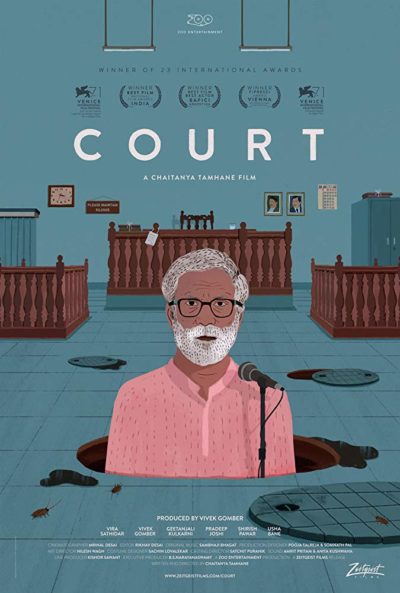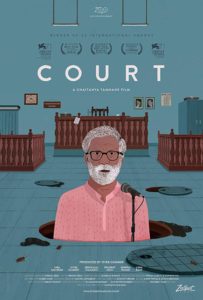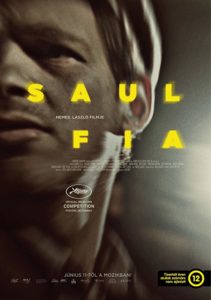
I arrived at the Chapter Arts Centre in Cardiff, in the middle of the monsoon season, to see this double bill of recently released subtitled movies. As I took my seat a pool of water formed quietly at my feet, I was beginning to think that I should have stayed at home and watched the films on demand as they are both available on Curzon Home cinema. However, they are both films, though not large in scale, that are best seen on the big screen.
Court
 This is an examination of the Indian legal system and a critique of the society as a whole. You might be frustrated or even angry watching it, but it is an eye-opening experience. A folk singer and poet, Narayan Kamble (Vira Sathidar) specialises in performing songs that are critical of the state and its inherent racism and endemic corruption. Arrested after one performance, he is put on trial for a trumped-up charge of inciting someone to commit suicide.
This is an examination of the Indian legal system and a critique of the society as a whole. You might be frustrated or even angry watching it, but it is an eye-opening experience. A folk singer and poet, Narayan Kamble (Vira Sathidar) specialises in performing songs that are critical of the state and its inherent racism and endemic corruption. Arrested after one performance, he is put on trial for a trumped-up charge of inciting someone to commit suicide.
The farcical nature of Indian’s court proceedings are shown in a meticulous detail that I found fascinating. Subject to endless delays when witnesses didn’t turn up or to allow the prosecutors to go and find evidence to back-up the claims they make in court, it is hard to believe we are looking a modern-day trial. Evidence is fabricated, and the judge seems fairly sanguine about that, despite the defence lawyer’s protestations.
Even when the case against Kamble completely falls apart, the trial goes on and the accused remains in prison. In fact, Kamble becomes a peripheral figure in the drama with the opposing lawyers taking centre stage. Geetanjali Kulkarni plays the callous and racist prosecution lawyer, and the excellent Vivek Gomber is Vinay, defending Kamble.
Director Chaitanya Tamhane allows scenes to unfold at a leisurely pace, often leaving his camera running long after the participants have left the shot. I have seen some criticism of that technique but I think it allows the viewer to contemplate the powerful moments that they have just seen. Depictions of the lawyers’ and judge’s personal lives at first seemed unnecessary but as the film went on, they added a real depth to the story. However, it is the absurd, almost Kafkaesque court scenes that will remain in the memory.
Rating: 8.5 out of 10
Son of Saul
 Interestingly, most of the reviews I have seen of Son of Saul start with addressing the debate about whether the film – or any film set in a German concentration camp – should be made at all. I find that a bit strange as it is not something that seemed to be discussed when similarly themed films were released. The despicable Life is Beautiful (1997) made such a camp seem more like one of the holiday variety and was rewarded with a clutch of Oscars.
Interestingly, most of the reviews I have seen of Son of Saul start with addressing the debate about whether the film – or any film set in a German concentration camp – should be made at all. I find that a bit strange as it is not something that seemed to be discussed when similarly themed films were released. The despicable Life is Beautiful (1997) made such a camp seem more like one of the holiday variety and was rewarded with a clutch of Oscars.
Anyway, in my book Son of Saul is definitely a film that should have been made, and one that ought to be seen. Director László Nemes uses great care and tact when depicting the scenes in Auschwitz. Using mostly close-ups of inmate Saul or point of view shots from just behind his head, the brutal treatment of the other prisoners can be seen but it is not front and centre.
Saul (Géza Röhrig) is a Sonderkommando at the concentration camp – a prisoner that is made to work in the death chambers, removing bodies after they are gassed, loading the ovens and disposing of the ashes. It is a job that gives him a reprieve for a few months before he too will suffer the same fate. Generally numbed to proceedings, he sees a young boy die and decides that he wants to give him a proper burial, telling people the lad was his son.
Undeniably harrowing, especially one sequence set at night when the gas chambers were full and the guards are using other methods to murder the inmates, and with believable and committed performances, this is a film that it almost seems churlish to criticise. However, as much as the depiction of the day-to-day workings in the camp is brilliantly done, I found the story of Saul and the boy quite hard to fathom. If he isn’t his son, as it seems to be the case, why go to suicidal lengths for that particular person? Also, it seemed a bit too easy for the prisoners to meet clandestinely and plot a doomed escape attempt.
Despite those minor faults, this is a film of great power, though not one I can imagine watching again.
Rating: 8 out of 10